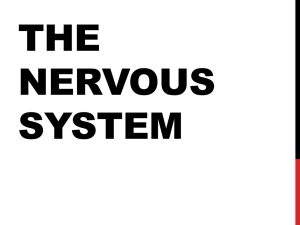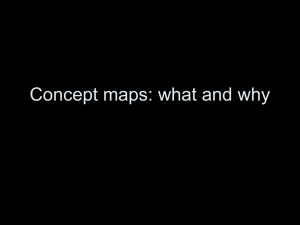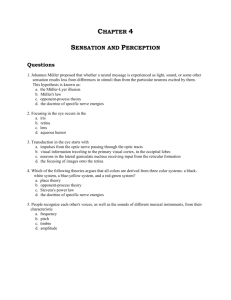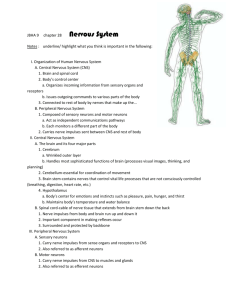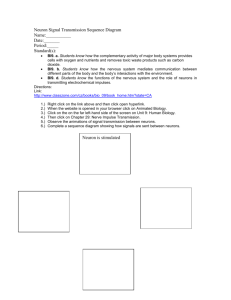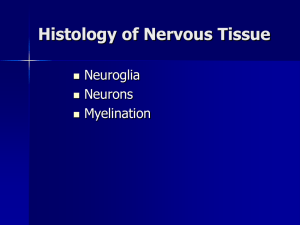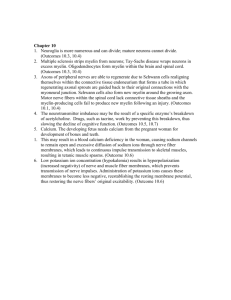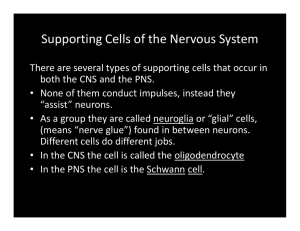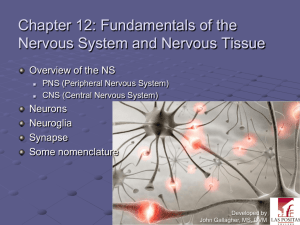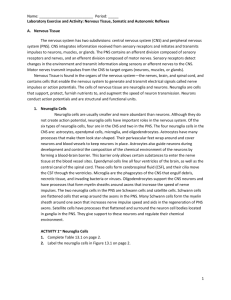The Nervous System (Chapter 7)
advertisement
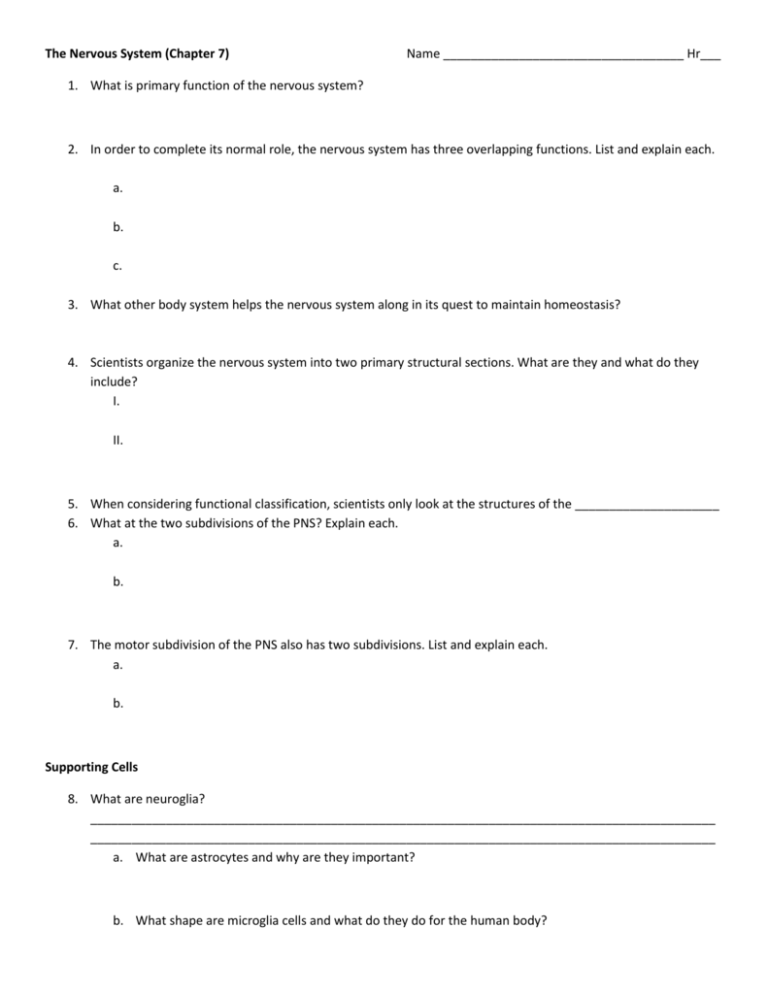
The Nervous System (Chapter 7) Name ___________________________________ Hr___ 1. What is primary function of the nervous system? 2. In order to complete its normal role, the nervous system has three overlapping functions. List and explain each. a. b. c. 3. What other body system helps the nervous system along in its quest to maintain homeostasis? 4. Scientists organize the nervous system into two primary structural sections. What are they and what do they include? I. II. 5. When considering functional classification, scientists only look at the structures of the _____________________ 6. What at the two subdivisions of the PNS? Explain each. a. b. 7. The motor subdivision of the PNS also has two subdivisions. List and explain each. a. b. Supporting Cells 8. What are neuroglia? ___________________________________________________________________________________________ ___________________________________________________________________________________________ a. What are astrocytes and why are they important? b. What shape are microglia cells and what do they do for the human body? c. Ependymal cells are found where? _______________________________________ i. What do these cells do? d. What are oligodendrocytes? Why are they important? e. Neuroglia resemble neurons, but can neuroglia transmit nerve impulses? ___________________ f. How are neuroglia cells different from neurons? g. Most brain tumors are _____________________ h. List the two types of supporting cells in the PNS and explain each. i. ii. 9. Nerve cells are also called ___________________ a. These cells have two major regions. List and Explain each. i. ii. b. Cell Body is composed of: i. Nissl Substance - specialized rough endoplasmic reticulum ii. Neurofibrils - intermediate cytoskeleton that maintains cell shape iii. Nucleus iv. Large Nucleolus c. Extension outside of the cell body i. Axons - ____________________________________________________________________ ii. Dendrites - _________________________________________________________________ Dendr = __________________ iii. Axon terminals - _____________________________________________________________ 1. Contain vesicles that contain _______________________________ 2. Axon terminals are separated from other neurons by a tiny gap called: _________________________ 3. What is a Synapse _________________________________________________________________ iv. Myelin - ____________________________________________________________________ Nerve Fiber Coverings: 10. Schwann Cells - (Be Specific in your answer) ___________________________________________________________________________________________ ______________________________________________________________ Related to Schwann cells are three other structures of a neuron. i. Myelin Sheath - _________________________________________________________ ii. Neurolemma - __________________________________________________________ iii. Nodes of Ranvier - _______________________________________________________ 11. Myelin insulation is very important to nerve transmission. What happens in people who have multiple sclerosis? Neuron Cell Body Location: Clusters of neuron cell bodies and collection of nerve fibers are named differently when they are in the CNS than when they are part of the PNS. 12. What are nuclei? _____________________________________________________________________________ 13. What is the difference between white matter and gray matter in the CNS? 14. In the CNS, bundles of nerve fibers are called _________________. In the PNS, they are called ______________. 15. What are ganglia? Classification of Neurons: Functional classification 16. List the three functional groups of neurons. Briefly explain each. a. b. c. 17. Inside the sensory neurons are specialized receptors: a. In the skin, they are called _____________________________ b. In the muscles and tendons, they are called ________________________________ i. They detect what type of stress? ______________________________ 18. Association neurons are also known as _____________________________. Structural Classification 19. List and explain each of the three types of structural neurons. a. b. c. 20. What are the two functional properties of neurons? a. b. 21. When the plasma membrane is resting or inactive, it is said to be __________________________. a. This means what? _____________________________________________________________________________________ _____________________________________________________________________________________ 22. Outline the steps of the generation of a nerve impulse along unmyelinated fibers using the reading on pages 202 and 203 and also the Figure 7.9 on page 203. ***This nerve impulse is an All or Nothing Response***** 23. What is depolarization? _______________________________________________________________________ 24. What is an action potential? What is another name for it? 25. What is repolarization? 26. What type of pump helps restore the neurons during repolarization? __________________________________ 27. The faster type of impulse propagation occurs in myelinated fibers and is called _________________________. 28. List a few of the factors that can impair the conduction of impulses. 29. What are reflexes? 30. Reflexes occur over pathways called ____________________________________ direct route from a sensory neuron, to an interneuron, to an effector 31. What are autonomic reflexes? Provide examples of these. a. What do these help regulate? 32. What are somatic reflexes? 33. What are the five elements necessary for reflex arcs? a. b. c. d. e. Reflex testing is an important tool in ___________________________________________________________________.

